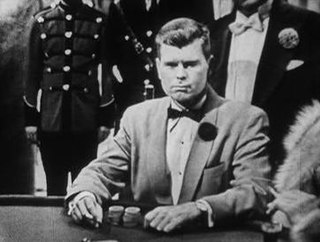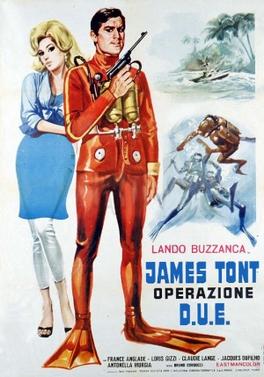M is a codename held by a fictional character in Ian Fleming's James Bond book and film series; the character is the Chief of the Secret Intelligence Service for the agency known as MI6. Fleming based the character on a number of people he knew who commanded sections of British intelligence. M has appeared in the novels by Fleming and seven continuation authors, as well as appearing in twenty-four films. In the Eon Productions series of films, M has been portrayed by four actors: Bernard Lee, Robert Brown, Judi Dench and Ralph Fiennes, the incumbent; in the two independent productions, M was played by John Huston, David Niven and Edward Fox.

Felix Leiter is a fictional character created by Ian Fleming in the James Bond books, films, and other media. The character is an operative for the CIA and Bond's friend. After losing a leg and a hand to a shark attack, Leiter joined the Pinkerton Detective Agency. The name "Felix" comes from the middle name of Fleming's friend Ivar Bryce, while the name "Leiter" was the surname of Fleming's friend Marion Oates Leiter Charles, the then wife of Thomas Leiter.

John Bernard Lee was an English actor, best known for his role as M in the first eleven Eon-produced James Bond films. Lee's film career spanned the years 1934 to 1979, though he had appeared on stage from the age of six. He was trained at the Royal Academy of Dramatic Art in London. Lee appeared in over one hundred films, as well as on stage and in television dramatisations. He was known for his roles as authority figures, often playing military characters or policemen in films such as The Third Man, The Blue Lamp, The Battle of the River Plate, and Whistle Down the Wind.

Edward James de Souza is a British character actor and graduate of RADA, who is of Portuguese-Indian and English descent.
Mark Connelly is a professor and Head of the School of History, at the University of Kent in Canterbury, where he is both a military historian, and the Reuters Lecturer in Media History. Connelly specialises in the 19th Century and First World War.
Nicholas J. Cull is a historian and professor in the Master's in Public Diplomacy program at the Annenberg School for Communication and Journalism at the University of Southern California. He was the founding director of this program and ran it from 2005 to 2019.

"Casino Royale" is a live 1954 television adaptation of the 1953 novel of the same name by Ian Fleming. An episode of the American dramatic anthology series Climax!, the show was the first screen adaptation of a James Bond novel, and stars Barry Nelson, Peter Lorre, and Linda Christian. Though he is based on the literary Bond, Nelson's character is played as an American spy working for the "Combined Intelligence Agency".

Eurospy film, or Spaghetti spy film, is a genre of spy films produced in Europe, especially in Italy, France, and Spain, that either sincerely imitated or else parodied the British James Bond spy series feature films. The first wave of Eurospy films was released in 1964, two years after the first James Bond film, Dr. No, and in the same year as the premiere of what many consider to be the apotheosis of the Bond series, Goldfinger. For the most part, the Eurospy craze lasted until around 1967 or 1968. In Italy, where most of these films were produced, this trend replaced the declining sword-and-sandal genre.

Nigger was a male black labrador retriever belonging to Wing Commander Guy Gibson of the Royal Air Force, and the mascot of No. 617 Squadron. Gibson owned the dog when he was previously a member of 106 Squadron. Nigger often accompanied Gibson on training flights and was a great favourite of the members of both 106 and 617 Squadrons. He was noted for his liking of beer, which he drank from his own bowl in the Officers' Mess.
Farhad Daftary is a Belgian-born Iranian-British Islamic scholar who is co-director and head of the Department of Academic Research and Publications at the Institute of Ismaili Studies in London. He is related to the Aga Khan IV.

Documentary News Letter was a magazine about documentary film founded by filmmaker John Grierson. The publication was developed as the wartime successor to World Film News, which ceased publication in 1938, and sought to promote a "documentary approach to everyday living." It published its first edition in January 1940, with an editorial board that consisted of Grierson, Paul Rotha, Basil Wright, Arthur Elton and Thomas Baird.

Christoph Baumer is a Swiss explorer and historian of Central Asia. Starting in 1984, he has conducted explorations in Central Asia, China, Tibet and the Caucasus, the results of which have been published in numerous books, scholarly publications, TV and radio programs.

"Hot Snow" is the debut episode of the 1960s cult British spy-fi television series The Avengers, starring Ian Hendry and Patrick Macnee. It originally aired on ABC on 7 January 1961. Only about 15 minutes, the first of three acts, remain. The episode was directed by Don Leaver and generally acknowledged to have been written by Ray Rigby, but Brian Clemens claimed to have written it.

James Bond is a fictional character created by the British journalist and novelist Ian Fleming in 1952. The character first appeared in a series of twelve novels and two short story collections written by Fleming and a number of continuation novels and spin-off works after Fleming's death in 1964. Bond's literary portrayal differs in some ways from his treatment in the James Bond films, of which there have been twenty-seven in total, produced and released between 1962 and 2021.
A bibliography of reference material associated with the James Bond films, novels and genre.
A list of books and essays by or about Sergei Eisenstein.
Stevan Riley is a British film director, producer, editor and writer. He was educated at the University of Oxford, where he studied Modern History. His films include Blue Blood (2006); Fire in Babylon (2010); Everything or Nothing (2012); and Listen to Me Marlon (2015). Stevan went to school in Dover, Kent, Dover Grammar for Boys.

Terje Tvedt is a Norwegian academic, author and documentary film maker.
The Monroe Doctrine, also known as The Venezuela Case,:52 is an 1896 American propaganda film. It features an allegorical fight over national determinism between the British Empire, the United States and Venezuela.











